All Your Burning Post-Finale ‘Yellowjackets’ Questions, Answered
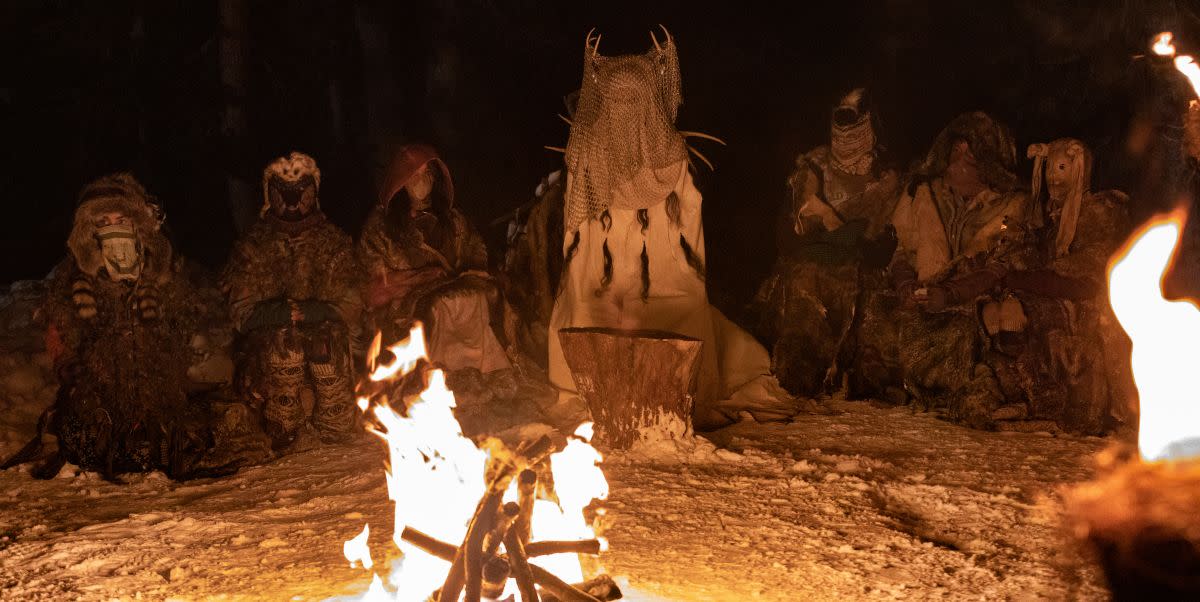
Let's face it, at this point we're all desperate for something to consume our imaginations other than the results and implications of our latest Covid-19 rapid test. Enter Ashley Lyle and Bart Nickerson, the married writing duo behind Showtime's Yellowjackets. The thriller debuted on November 14, but it's popularity slowly simmered, coming to a boil during the holidays, when would-be viewers finally succumbed to a word-of-mouth campaign hyping up the addictive series. Alternating between 1996 and 2021, the series follows a girls' high school varsity soccer team whose plane crashes in the mountainous wilderness of the Pacific Northwest and becomes stranded for 19 months; in the present, the survivors of the crash deal with their trauma and the fallout of the secrets they thought they buried in the woods. (Cannibalism? Or, as the show heavily implies, something…somehow worse?)
Yellowjackets boasts perhaps the best soundtrack currently on TV, an assemblage of Nineties jams, and a cast packed full of Nineties icons playing some of the adult survivors, led by Melanie Lynskey, Juliette Lewis, Christina Ricci, and Tawny Cypress. But what's captured the rapt attention of Reddit sleuths is the show's perfect mix of prestige-TV realism and internet-baiting mystery: Do the girls succumb to the supernatural out in the woods, or to the varied manifestations of their own psychological turmoil? Who are the acolytes of the "Antler Queen"? Is popular girl Jackie alive or dead, and if she's dead, why does her diary include mention of movies released long after her demise? Who is the "Man with No Eyes"? Who is Adam, really?
After devouring the show's first season finale (it's already been renewed for a second season), we harangued Lyle and Nickerson into answering all our burning questions. Spoiler alert, reader beware.
Children of the Nineties all remember Alive. It revived interest in the "Miracle in the Andes," the real-life story of how a Brazilian soccer team and others survived for two months after a plane crash, partly by eating those who didn't survive. How did that transform in your heads into a way to tell a story about, of all things, teenage girlhood?
Ashley Lyle: Obviously, we were both very fascinated by that particular story. I've seen the movie Alive many times over, partly because of my middle school crush on Ethan Hawk. And there are all these other related points of inspiration—the Donner Party, and a really incredible book called The Hunger, which is about a fictionalized version of the Donner Party. But we made a pretty concerted effort once we started developing the show to specifically not go back and revisit those things because we really wanted to channel what had buried itself in our psyches as opposed to using that material as a blueprint. What was most interesting to us was how exactly these stories wormed their way into our collective consciousness, and how we could mine that to find new territory for our characters and a completely different approach.
Bart Nickerson: On the one hand one, there's the idea of cannibalism. There's something about the taboo—there's something visceral and organic about a total license to the experience of consuming human flesh. And there's something more to it when you put it next to the depths of a certain kind of friendship found a lot in high school girls. For some reason, for us, when you put that kind of closeness and connectivity close to each other, a lot of charge starts to jump between them—and I think there's a lot of compelling energy there.
AL: There's a combustible quality to that kind of intimacy. There's a really deep connection and there's a lot of love, and I think that love comes with resentment, tension, and friction that's always at odds with itself and is playing off of itself.
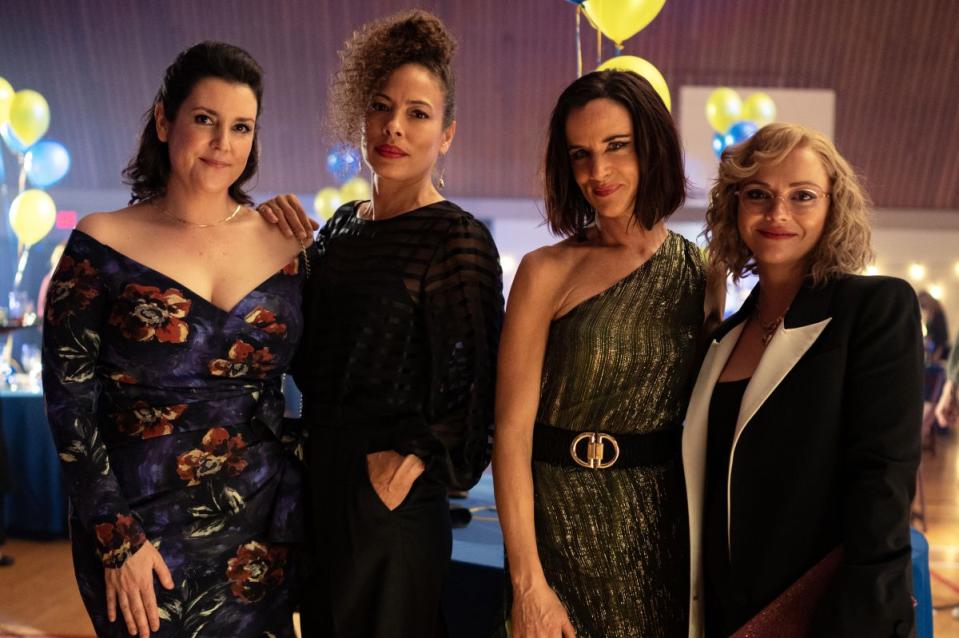
High school is a very dog-eat-dog environment, and that's more literal in this case than most.
AL: What's interesting to me is that we knew what we didn't want to do with that kind of story. This is a movie that I really enjoy, that I've seen many times over, but something like Heathers has a much more arch approach to that kind of dog-eat-dog teenage experience. But we wanted to do something that felt more authentic to our experiences. That's not to say that Heathers isn't brilliant, but we just didn't want to go there. We wanted it to feel a little bit more grounded.
Those are a lot of different elements to balance. Did you ever pitch this story to anybody who just didn't get it before it came to Showtime?
BN: I guess it can be hard to tell because people tend to be polite! But there were certainly people who didn't buy it. There wasn't anybody that was like, "I just don't know what you guys are trying to do." It was usually just like, "Thanks, we'll let you know."
AL: I think what was more interesting to us than the passes we got—in certain cases, it just wasn't right for that particular network and what they wanted to do with their programming—were the people who were interested in it, but who were seeing it in very different ways. We got some interest from a number of different places that were extremely different in terms of their brand and the type of shows that they make. So there was clearly something about this idea that was malleable in people's minds. Each time we pitched it, people could see a different version of it. And ultimately we got very lucky that Showtime saw the exact same version of it that we did.
BN: I could see a scenario where a certain kind of executive would think the idea was fun, but just feel like what we were trying to do was maybe too wide, trying to do too many things. "Could it be this kind of show? Or could it be this kind of show?" And each time it would be taking only a piece of what the show wanted to be. But Showtime immediately saw the totality of it the way that we did. They really embraced how difficult the show would be to categorize.
Tonally, the show is able to straddle suspense, horror, and comedy perfectly. That balance is perfectly encapsulated in the instantly classic line Jeff says to Shauna, "Wait, there's no book club?!"
AL: Absolutely. I think those moments of comedy are really important—they allow for the darkness without it becoming overwhelmingly bleak, grim, and un-fun. But also, as writers, we always wanted to be able to stretch those muscles a little bit, to have fun with the script and to have fun with these characters.
We had so many moments where we said, "I can't believe they're letting us do this!" Like [the dream sequence] where Shauna gives birth to the chicken baby, or the fact that this is a show where a teenage girl is helping her coach, whose leg she amputated, try to relieve himself while she sings [the Deep Blue Something song] "Breakfast At Tiffany's." I mean, they really let us go for it—and we're so glad they did.
And yet we all still have a crush on Coach Ben.
AL: Poor, long-suffering Coach Ben. Steven Kruger [who plays Ben] is actually the only actor on our show who we had worked with before, and we brought him on specifically for this role. We're thrilled that people are connecting with him in the way that they are because he really has drawn the short straw in so many ways.
BN: There was a moment on set where his character is having a breakdown in the mud, and Steven was just like, "What did I ever do to you guys? I thought we were friends!"
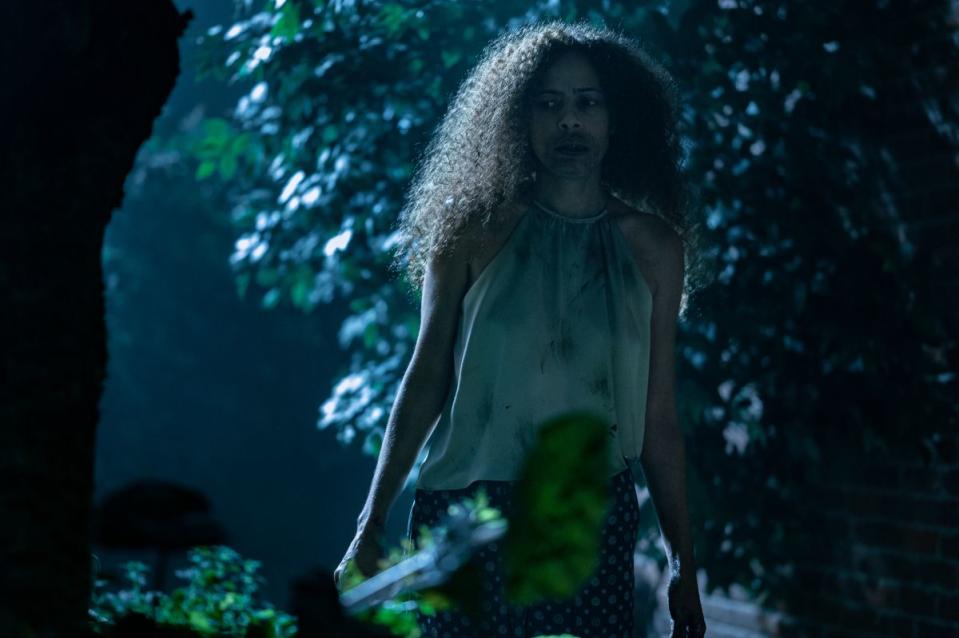
A major theme throughout the show is the short- and longterm effects of trauma. As a symptom of the characters' isolation and paranoia, when they read too much into things, we read too much into things; they trust no one, we trust to no one. Was that by design or did the themes of the show and the format in which it's told dovetail as you began to write and expand on the premise?
BN: That was very much by design. One of the things that we really wanted to explore is the legacy of trauma in how it affects the way one navigates the world moving forward. To what extent do the behaviors, instincts, and inclinations that one develops in a pumped-up, dangerous situation translate back to the real world? How can the survival mechanisms our bodies or minds develop actually be very effective when they're deployed in the context in which they were developed, or ineffective in a different context where those survival tactics might not translate?
For example, Shauna's paranoia probably served her very well in what we're going to be seeing in the 1996 storyline. But when it's being used to assess the person that just rear-ended her, is not as useful. So Shauna was not correct about Adam, but she wasn't wrong to have her antenna up. Because she doesn't get to have a normal life.
AL: We talked a lot in the writer's room about trying to create an immersive experience for the audience in terms of putting them inside our characters' point of view, to essentially put them inside that subjectivity. It was an experiment with results that we couldn't have anticipated, which is really cool and really interesting to see. We wanted the audience to feel that paranoia in the same way that our characters would feel that paranoia. That was very much by design.
I was so proud of myself early on for thinking that Adam was a grown-up Javi, and the show really made a chump out of me. Am I to take this as confirmation that I was wrong?
AL: It's funny because we certainly discussed how the possibility of Adam-as-Javi would occur to our characters, the audience, and the world at large—especially in terms of that immersive paranoid experience. But we did not anticipate that people would latch onto it as quickly or as strongly as they did. So that was really interesting for us. But in our minds, as storytellers, we ultimately thought, "What is more tragic and a more perfect encapsulation of the consequences of trauma than for this relationship to explode in this devastating and tragic way?" Like, how fucking sad would it be if Adam really was just a guy who fell in love with Shauna, but that because of what had happened to her, it was an impossibility for her to accept that. We were hopeful that it would work on both of those levels—that we would see that vision of paranoia, and then of heartbreak when the truth was revealed.
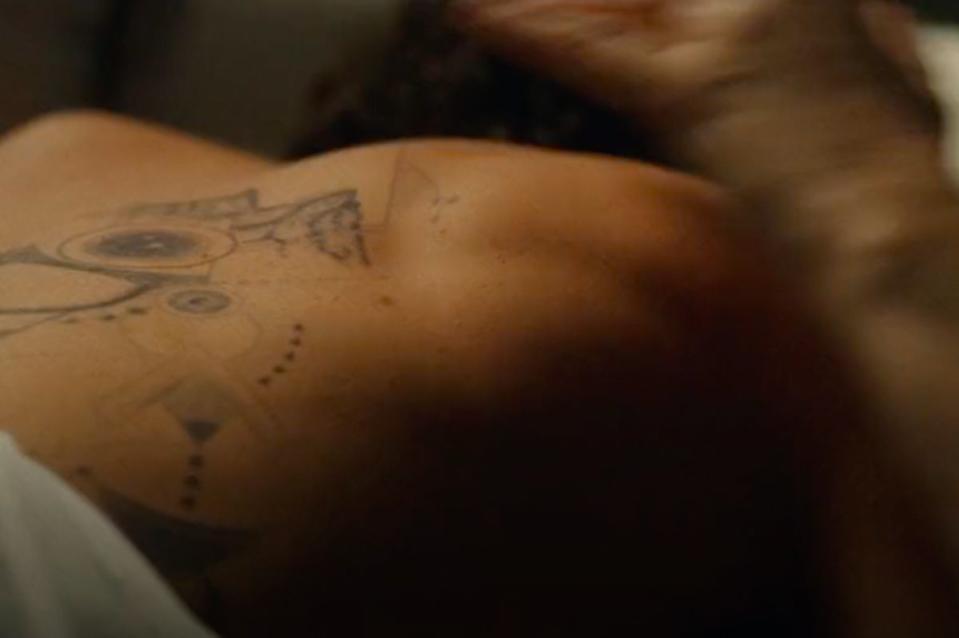
Fans latched on to a glimpse of Adam's back tattoo, which depicted what looked like a map of mountains. What was up with that?
AL: We were very careful when we were designing the tattoo because you have to design your own tattoos [for a TV series] so that you don't get into any legal clearances with the tattoo artist. We looked at a wide range of real-life tattoos with our production designer and our art director. We wanted something that was conceivably common, and this is the type of tattoo that exists very much out in the world, but that would also lend itself to that little nagging question of, "Is this just a guy who fancies himself a little bit of a hippy, free spirit…or is this related?"
BN: And to go back to the discussion of trauma, by embedding you into the subjective experience of our characters—by using Shauna's paranoia via the conventions of television—we wanted to make the audience to a certain extent complicit in what ultimately happens to Adam. At the moment of their confrontation, the intent was to have the entire audience with Shauna and complicit in what happens next—which is to say, you killed Adam.
The show toes the line between the supernatural and experiences that might be the result of mental illness, or of faith, or of a longstanding trauma. How much of it do you expect to be the audience experiencing the characters' subjective reality, and how much did you expect that we would take it at face value? You've said before that this isn't necessarily a supernatural show, but some viewers still think that it's a supernatural show.
AL: It really has become a Rorschach test. It's fascinating that there are people who fully believe that it is a supernatural show, and then there are people who are like, "What are you talking about? This is obviously just them slowly losing their minds together!" And that, again, was by design, because ultimately we don't have the answers as to whether or not the supernatural exists.
But I still think it's an incredibly fascinating question. We're genuinely not trying to be coy, but to us, the crux of it is that whether or not something is "real," if somebody believes it to be true or believes it to be real, then it has very real consequences. That is something we're investigating in this show.
BN: I think those are the big questions. We don't want to be ambiguous as much as we want to acknowledge that it's unknown, this idea of what it would mean for a supernatural phenomenon to be real. There are things that are very ephemeral and hard to pin down. One thing that I talk about sometimes is the phenomenology of possession. This is an experience that some people have. Your external interpretation of it can range from genuine demonic contact to a psychotic break. But one thing that's not to be disputed is that there is a person at the center of that experience who is having a real experience. That's what we want to explore to a certain extent: 1. How much of their belief does the person at the center of it even have control over? 2. What does it actually mean for an experience to be real?

You pitched the show with a five season plan and a specific end point. But by immersing us in the characters' perspective—whether it's Lottie's dreams or Taissa's apparent sleepwalking—you've introduce a lot of questions. Is the "Man with No Eyes" real? Is the man who says "We've been waiting for you?" in the finale real? With so many fans scrutinizing the show online, do you ever fear that the audience will want answers for something you didn't intend to give answers for—and suddenly you're stuck with your own version of the polar bear from Lost?
BN: Wait a second, that actually hadn't occurred to us! [Laughs]
AL: Every day! We have that fear every day!
BN: But we should be so lucky as to fall into the "Polar Bear Trap." We're talking an iconic show that is such a touchstone for everything that came after it and is also just great!
AL: I think what we can say is that we are very aware of it. When we're in the writer's room, we always approach any of these instances that could be interpreted as supernatural from both sides. We want to make sure that we never present something that we don't have an answer for. Specifically, we always want to have two answers. We always talk about everything from either side—was it a genuine supernatural occurrence? Or how might be explained from a skeptic's point of view, how could there be a logical or natural explanation for any of these phenomena? We're never throwing something out there and then thinking, "Oh, we'll figure that out later."
BN: Right. We are a show that wants to get a right up to that border between the known and the unknown. And I think that there is a way to maintain the magic of a mystery without making people feel like, "Oh, they're just throwing a bunch of shit at the wall." We're exploring characters and digging out the subjective experience of those characters.
You have one of the best casts on TV. Once you decided that the show was going to start in the Nineties, did you deliberately envision a stacked cast of enduring Nineties icons?
BN: The power of being able to do that occurred to us pretty early, but in the end, first and foremost, we just wanted to get great actors. We knew that these were very challenging roles that required a certain level of depth and skill. And then the fact that we are getting to work with so many icons is a really just icing on the cake.
After the finale, we know that Lottie survived to the present day, or at least post-crash. Do you have a dream casting in mind for her?
AL: We have not cast our adult Lottie yet, but we definitely have some ideas that we are very kind of quietly and secretly putting out into the universe at this point. But we probably shouldn't say more about that because it's very much in-process.
Have you heard the internet's cries for Winona Ryder to be cast in the show?
AL: Oh yeah. I mean, we mostly just pitched the show so that we could work with all these legends, our childhood icons. The Nineties were such an incredible time for film and television—it's great that there were all these amazing actresses who were working then and who are now the right age to play our characters. There's a bit of a gold mine there.
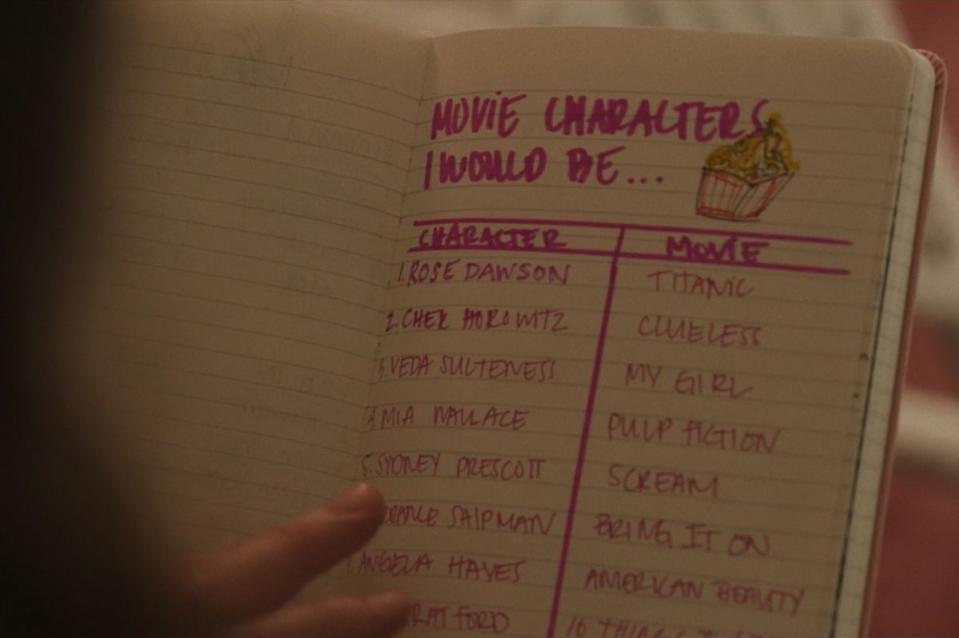
We saw Jackie's frozen body in the finale, but I feel I still need to ask: is Jackie indeed dead?
AL: Jackie is dead.
Yet when Shauna peruses what appear to be Jackie's old journals in the present day, the journal references movie that came out after the years the girls were stranded in the wilderness.
AL: The journals were not a mistake. The license plates were.
That was my next question! Fans online have noticed that Adam and Misty's cars have he same license plate. So you're saying that was a whoopsie.
AL: We're very honest here.
We've met Jackie's parents and seen that they still have a personal relationship with Shauna, but we know nothing about Shauna's family or home life. Was that something you wanted to keep open-ended at this point?
BN: We really haven't met a lot of the survivors' parents. So the intent would not necessarily be that we would never see her parents. It's just not a piece of the story that has been deployed yet.
You went through great lengths to hide the identities of the six fur-clad characters who are sitting alongside the "Antler Queen," as the internet has dubbed her, in the first episode of the series. Other than Samantha Hanratty, who plays a young Misty and was revealed as one of the six characters, the rest were played by body doubles. Now that the finale has revealed Van and Misty to be followers of Lottie, the presumed Antler Queen, are we to assume that the identity of another one of the six followers has been revealed?
AL: We plead the fifth.
But do you know the identities of those six characters?
BN: Do we know, yeah.
AL: We know who is participating in the Feast of the Antler Queen.
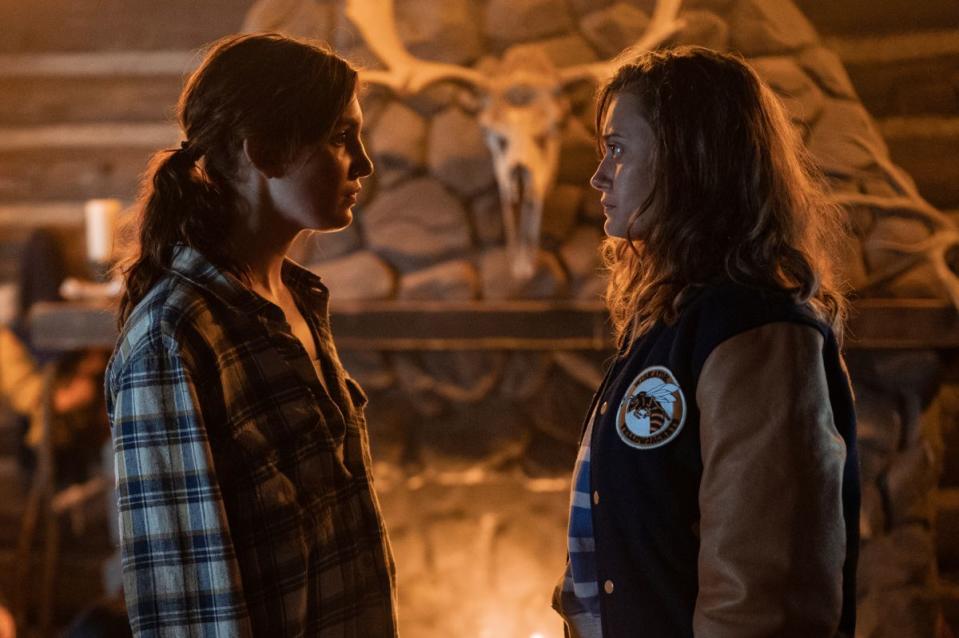
The "Feast of the Antler Queen" is a beautiful, term. At one point in the show, Jessica, the "fixer" who says she was hired by Taissa, tells her, "Some of you guys really love living off the grid." Has she met survivors other than Travis and the women we've met so far?
BN: We're going to plead the fifth on that one also. Sorry!
That only tantalizes me more, to be honest. Are we going to learn more about the other girls who survived the plane crash and have appeared on screen, but who may not have been even named yet?
AL: That is very likely moving forward. That is a doorway that we intentionally left open.
Last question, perhaps the most important: how do you explain Misty's love of gas station beef jerky?
AL: I mean, look, Taissa is a vegetarian; Misty is eating jerky. Everyone reacts to things in their own way.
You Might Also Like


